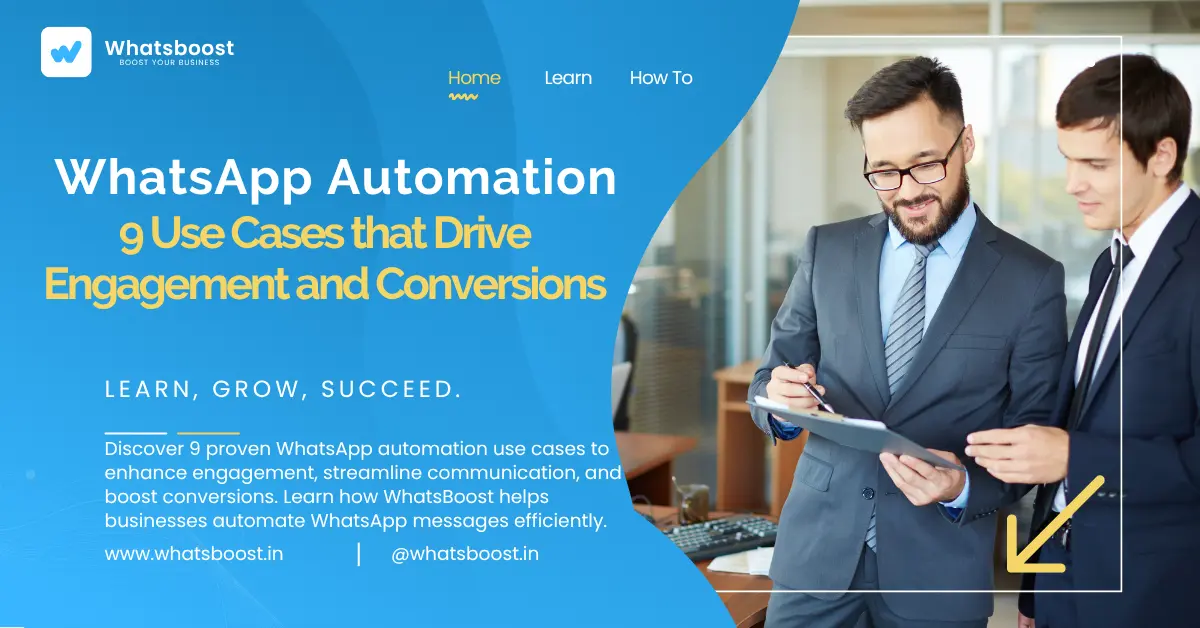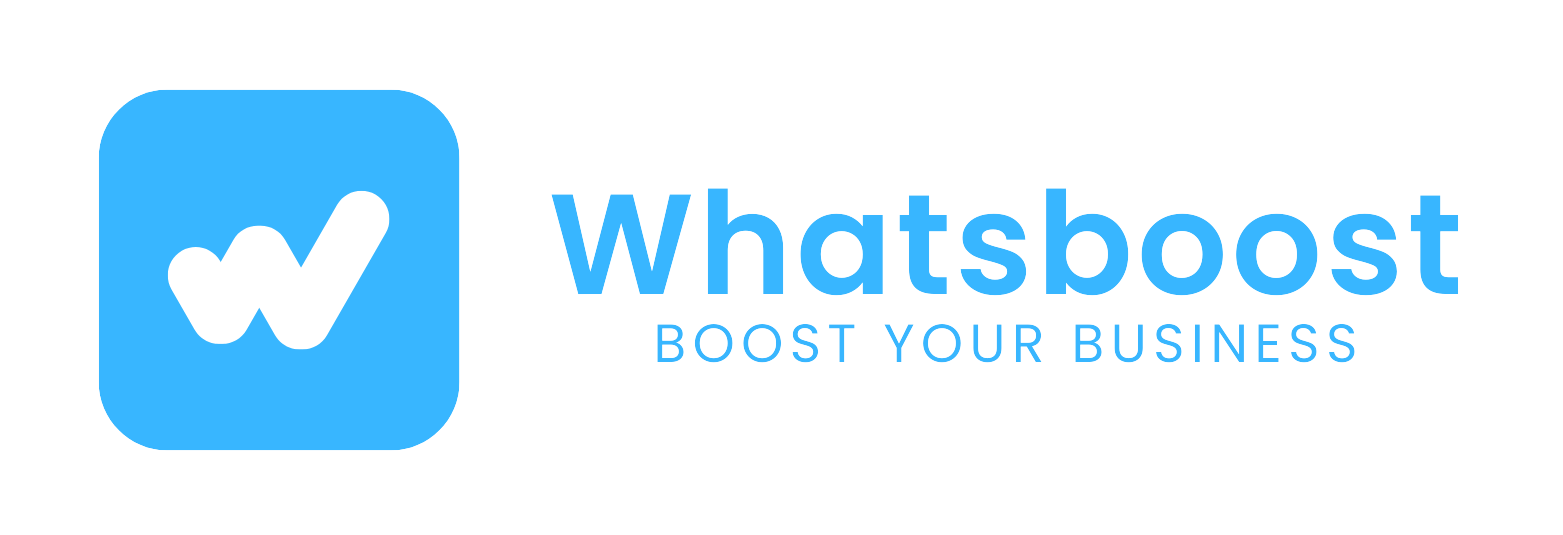
WhatsApp Automation: 9 Powerful Use Cases to Drive Engagement and Conversions | WhatsBoost
Discover 9 proven WhatsApp automation use cases to enhance engagement, streamline communication, and boost conversions. Learn how WhatsBoost helps businesses automate WhatsApp messages efficiently.
WhatsApp Automation: 9 Use Cases that Drive Engagement and Conversions – A WhatsBoost Guide
Businesses across industries are rapidly adopting WhatsApp automation to simplify customer communication and improve engagement. With over 2 billion active users, WhatsApp has evolved beyond personal messaging into a powerful channel for marketing, customer support, and sales automation.
Using automation, businesses can deliver consistent, contextual, and timely communication—without relying on human intervention. According to Forbes, 74% of consumers are more likely to purchase based on brand experience alone. With automation, you can ensure a smooth, unified customer journey across all digital touchpoints.
In this comprehensive guide, we’ll cover what WhatsApp automation is, explore 9 powerful WhatsApp automation use cases, and explain how WhatsBoost helps businesses implement automation easily—without relying on complex APIs.
Understanding WhatsApp Automation
WhatsApp automation refers to automating customer interactions using tools like WhatsApp Business App, WhatsApp Business API, or platforms such as WhatsBoost. These automations allow businesses to send messages, schedule replies, capture leads, or run campaigns automatically.
Automation ensures:
-
Faster responses
-
Reduced manual workload
-
Round-the-clock engagement
-
Higher conversion rates
For example, if a customer asks for your store location, an automated WhatsApp reply can share the nearest branch along with a Google Maps link—instantly. This eliminates waiting time and enhances the overall customer experience.
While basic automation handles pre-set replies, advanced systems like WhatsBoost enable complete workflow automation—right from lead capture and nurturing to follow-ups and reminders—without requiring API access.
Explore how it works at WhatsBoost.in.
Benefits of WhatsApp Automation for Businesses
-
Improves Customer Experience – Customers receive instant, consistent replies even outside business hours.
-
Increases Efficiency – Routine queries and repetitive follow-ups are handled automatically.
-
Boosts Sales – Personalized nurturing sequences guide leads through the buying journey.
-
Reduces Operational Costs – Eliminates the need for a large support team.
-
Enhances Brand Image – Quick, professional, and personalized messaging builds trust.
9 WhatsApp Automation Use Cases That Drive Engagement & Conversions
Let’s explore nine practical WhatsApp automation use cases that can transform how your business communicates with customers.
1. Welcome Messages
A first impression sets the tone for customer relationships.
Automated welcome messages greet users instantly when they connect with your brand on WhatsApp. This shows attentiveness and professionalism, encouraging customers to engage further.
Example:
“Hi {{Name}}, welcome to {{Brand Name}}! We’re glad to have you here. Let us know what you need, and we’ll help you.”
WhatsBoost is a platform which allows you to automate instant lead response sequences for each new lead captured through forms, websites, or CTWA ads or any lead source.
2. Pre-Set Replies to FAQs
Speed matters—90% of customers expect immediate responses. You can automate frequently asked questions using keyword-based replies on WhatsApp.
Example:
-
“What are your business hours?” → Automated reply with timings.
-
“Where is your store?” → Auto message with location map.
With WhatsBoost, you can create FAQ libraries, automate responses, and integrate with your help center links to improve self-service efficiency.
3. Shipment and Tracking Updates
Customer experience doesn’t stop at checkout. Sending order confirmation and tracking updates builds trust and reduces support inquiries.
Example automation:
-
Order confirmation
-
Dispatch notification
-
Delivery updates with tracking link
Using WhatsBoost, businesses can integrate their eCommerce or ERP system to send automated shipment updates directly via WhatsApp.
4. Marketing Messages and Campaigns
WhatsApp automation makes marketing more personal. You can set up automated promotional campaigns triggered by customer actions—like product views, cart additions, or previous purchases.
Examples include:
-
Festival offers and limited-time discounts
-
Product launch notifications
-
Event or webinar invitations
With WhatsBoost, you can design drip campaigns and schedule broadcasts while maintaining compliance with WhatsApp’s opt-in policies.
5. Timely Reminders
Automated WhatsApp reminders help customers stay informed about appointments, payments, or renewals—while saving staff hours of manual follow-ups.
Example use cases:
-
Appointment reminders for clinics or salons
-
EMI or payment reminders for financial services
-
Webinar or event reminders
WhatsBoost’s Google Sheet integration makes it easy to trigger reminders automatically based on date and time fields.
6. Customer Appointments
For industries like healthcare or consulting, appointment confirmations and reminders are critical. Automating appointment messages ensures clients receive timely confirmations, reminders, and follow-ups.
Example:
“Your appointment with Dr. Sharma is confirmed for Monday, 4 PM. Please reply CONFIRM to keep your slot or RESCHEDULE to choose another time.”
With WhatsBoost, such workflows can be connected with CRM or form data seamlessly.
7. Abandoned Cart Messages and Product Recommendations
According to Baymard Institute, nearly 70% of carts are abandoned. WhatsApp automation can recover lost revenue through personalized follow-ups.
Example:
“Hi {{Name}}, you left items in your cart! Complete your purchase within 24 hours and get 10% off.”
You can also send product recommendations based on user behavior. WhatsBoost enables dynamic message personalization using variables from connected Google Sheets or Shopify data.
8. Away Messages and After-Hours Support
Even when your team is offline, customers may still reach out. Automated away messages let them know your business hours and alternative contact options.
Example:
“Thanks for your message! Our team is available from 10 AM to 6 PM. Meanwhile, you can visit our Help Center: [link].”
WhatsBoost enables intelligent scheduling of such away messages, ensuring customers are always acknowledged promptly.
9. Feedback and Review Collection
Collecting customer feedback is essential for building credibility. Automated messages requesting reviews or ratings after a purchase enhance trust and provide valuable insights.
Example:
“Hope you loved your purchase, {{Name}}! Please rate your experience here: [link]. Your feedback helps us improve.”
WhatsBoost lets you schedule post-purchase follow-ups automatically, closing the customer loop efficiently.
Advanced WhatsApp Automation with WhatsBoost
While WhatsApp Business API offers automation capabilities, setting it up can be complex and costly. WhatsBoost simplifies automation without requiring API access.
Here’s what makes it unique:
-
No API Dependency: Create workflows using Google Sheets, Zapier, or Pabbly Connect.
-
Multi-Device Support: Run multiple WhatsApp accounts in one dashboard.
-
Automations and Triggers: Build custom message sequences for different lead actions.
-
AI-Ready Chatbots: Enable conversational automation for smarter responses.
-
Group Messaging: Send or automate messages inside WhatsApp groups.
-
Integrations: Connect with over 7,000 apps including Shopify, FlexiFunnels, and CRMs.
Learn more about automation features at WhatsBoost.in.
FAQs About WhatsBoost Automation
Q1. Does WhatsBoost work without WhatsApp Business API?
Yes. WhatsBoost enables full automation using inbuilt APIs and webhooks—no official WhatsApp API required.
Q2. Can I integrate WhatsBoost with my CRM or Google Sheets?
Absolutely. You can use Google Sheet triggers or webhook integrations to connect WhatsBoost with your CRM or website forms.
Q3. Can I run drip campaigns using WhatsBoost?
Yes. WhatsBoost allows you to design automated drip campaigns with templates that include images, videos, and documents.
Q4. How does WhatsBoost prevent bans during automation?
WhatsBoost includes intelligent message randomization and safe delivery intervals to mimic natural conversations.
Q5. Does WhatsBoost support WhatsApp group messaging?
Yes. You can automate messages to WhatsApp groups for training sessions, community updates, or customer onboarding.
FAQs About WhatsBoost Features
Q1. What kind of automations can WhatsBoost perform?
WhatsBoost can automate follow-ups, reminders, lead nurturing, broadcasts, and group messages across multiple WhatsApp numbers.
Q2. How many apps can WhatsBoost integrate with?
Over 7,000—including Zapier, Make, Pabbly Connect, FlexiFunnels, and Shopify.
Q3. Can WhatsBoost be used for both marketing and support?
Yes. It helps automate both promotional campaigns and customer support replies for a unified experience.
Conclusion
WhatsApp automation is transforming how businesses communicate with customers—driving faster engagement, consistent interactions, and higher conversions.
With WhatsBoost, any business—whether small or enterprise-level—can implement smart WhatsApp automations effortlessly, without technical setup or API dependency.
From sending welcome messages to building complex nurturing funnels, WhatsBoost makes it simple, secure, and scalable.
Start your free trial today at WhatsBoost.in and explore the future of customer engagement through WhatsApp automation.
